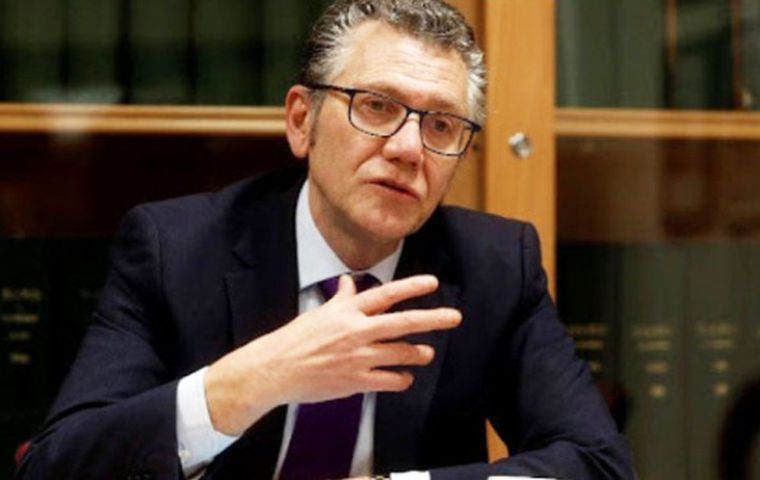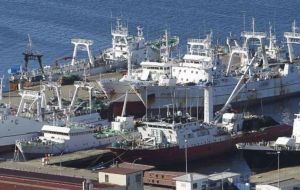MercoPress. South Atlantic News Agency
April 30, a critical date for when Falklands first squid catches are landed in Spain
 “We are negotiating and looking at different options with the Spanish government to try and minimize the impact of the tariffs, according to WTO rules”, pointed out Touza (Twitter)
“We are negotiating and looking at different options with the Spanish government to try and minimize the impact of the tariffs, according to WTO rules”, pointed out Touza (Twitter)  Falklands represent 20% of landings in Vigo, and the whole Galician industry could suffer, crews, companies, workshops since the Falklands fleet returns to Vigo twice a year
Falklands represent 20% of landings in Vigo, and the whole Galician industry could suffer, crews, companies, workshops since the Falklands fleet returns to Vigo twice a year April 30 is a critical date for when the South Atlantic squid catches reach Vigo in Spain. It will also be a Brexit test since tariffs involving third countries such as the UK do not apply to catches from British waters, except for increased customs paperwork, but do apply for fish produce from British territories overseas.
Tariffs range between 6% and 16% according to the Galician media, and quoting Javier Touza, from Galician Cooperative, ARVI, who is relatively optimistic about the issue, is also concerned on a possible outcome.
“We are negotiating and looking at different options with the Spanish government to try and minimize the impact of the tariffs, according to WTO rules”, pointed out Touza, who added that 90% of the Falklands' catches ends in Galicia for its processing.
“We are interested in quick solutions since in April we will be receiving the first shipments from the Falkland Islands. If tariffs are valid by then it will have an impact for the Falklands' government, since taxes on fishing companies is among the main items of revenue, and with over costs, the level of benefits, and taxes, is lower. And for the product itself, with the increase in costs, we will be losing competitiveness with produce from other origins”, argued Touza.
And this could also have consequences for companies and Vigo, and Galicia processing plants if catches are unloaded in other destinations, Falklands represent 20% of landings in Vigo. In effect the whole industry could suffer, crews, companies, workshops since the Falklands fleet returns to Vigo twice a year at the end of seasons.
“I am optimist because there is an interest for a solution from both sides, Britain, because it supports the Islands and Spain because of economic activity and jobs” Touza underlined
Likewise the president of the Port Authority, Jesús Vazquez Almuiña points out that the problem is for Great Britain as “a third country and since relations have changed”.
”Vigo needs more closer monitoring because there are no tariffs for catches from the Gran Sol (British waters), but rather a proliferation of customs and sanitary controls. The new situation will affect Vigo because of the new rules and because when it comes to the Falklands, it involves tariffs“
Vigo is planning spaces for a Customs office, non rigid without fixed hurdles, ”but controls will make everything slower. With the quotas system fresh landings are expected to drop, and with Falklands, tariffs must be applied“.
”The fact is that companies will have to pay tariffs to have fish admitted in the EU. They are still negotiating and have a five year margin, but nevertheless it is a very serious situation unless an agreement is reached,” concluded the port authority.




Top Comments
Disclaimer & comment rulesCommenting for this story is now closed.
If you have a Facebook account, become a fan and comment on our Facebook Page!